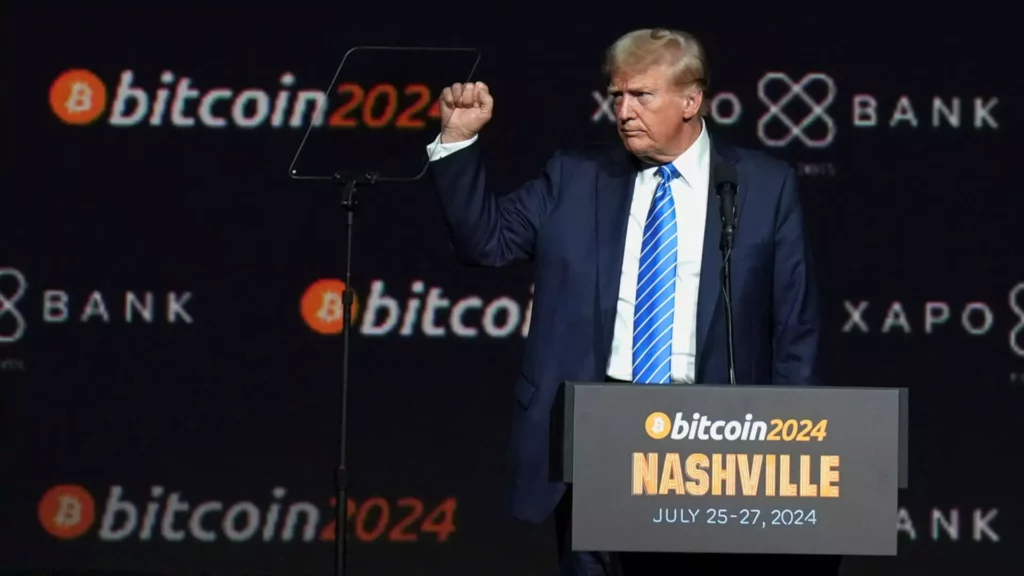In an unprecedented maneuver that has sent ripples through both Wall Street and the cryptocurrency community, Trump Media has disclosed plans to raise an astonishing $2.5 billion from institutional investors. This hefty capital injection aims to bolster the company’s footprint within the digital currency sphere, a move that, while ambitious, has drawn skepticism from many corners. The immediate aftermath of the announcement saw Trump Media’s stock tumble nearly 10%, casting doubt on the viability of the company’s strategy for entering the chaotic yet potentially lucrative realm of cryptocurrencies.
What stands out in this endeavor is not merely the financial scale of the raise but the transformational ambition it embodies. For a company under the Trump banner, this shift from a social and political platform to a contender in the highly competitive financial services sector speaks volumes about its aspirations. The funds are earmarked primarily for the acquisition of Bitcoin, a strategic pivot that not only aims to diversify the company’s holdings but seeks to establish its identity as a player in the “cryptocurrency revolution.”
A Unique Brand of Politics and Finance
This bold announcement aligns with the backdrop of Bitcoin 2025, a significant event that gathers crypto enthusiasts on the Las Vegas Strip and dubs President Trump as the nation’s first “crypto president.” The political implications are profound. The convergence of influential figures at the conference, including Vice President JD Vance and Trump’s sons, suggests that this initiative is less about mere financial gain than it is about political positioning. Within the conservative base that cherishes ideals of digital freedom, Trump Media is effectively marrying technology with a political narrative, a fusion that likely aims to rally its supporters around the concept of economic liberation through cryptocurrency.
The rhetoric emitted from Trump Media underlines a growing sentiment within certain factions of the conservative movement concerning the perceived institutional bias present in traditional banking systems. By claiming Bitcoin as an “apex instrument of financial freedom,” Devin Nunes, the company’s CEO, engages with a narrative that resonates deeply with many conservatives who feel stifled by current financial institutions. This viewpoint casts Trump Media as a champion of businesses that believe they are sidelined by the mainstream financial system.
The Risks of Chasing Digital Dreams
Nevertheless, the audacity of Trump Media’s approach brings a fair share of risk. With a market valuation hovering around $5.3 billion and last year’s revenues barely scraping $3.6 million—alongside a staggering loss of $400 million—the disparity between its high-flying ambitions and its existing financial realities raises significant red flags. Is it sustainable for a company with such a fragile economic foundation to pursue such avant-garde strategies?
Moreover, the collaborative efforts with Crypto.com to develop exchange-traded funds (ETFs) and a myriad of digital asset products hinge on regulatory approvals that are anything but certain. This partnership is indicative of a forward-looking strategy that aims to tap into Crypto.com’s impressive user base of over 140 million, but it also emphasizes the uphill battle that Trump Media faces amid fierce competition and stringent regulatory landscapes.
The Crypto Crusade and Political Underpinnings
The trajectory taken by Trump Media falls in line with a broader trend among politically aligned enterprises. Many are increasingly trying to extricate themselves from traditional banking institutions perceived as hostile, a sentiment amplified under the current Biden administration. Testimonies from crypto innovators about facing barriers in banking access tell a tale that aligns with Trump’s critiques of major banks like Bank of America and JPMorgan, which have been labeled as exclusionary toward conservative values.
Additionally, the introduction of Truth.Fi and the ascending visibility of Trump-linked cryptocurrencies convey a sense of urgency; the political currents are inciting private sector innovation in response to these perceived injustices. This evolution mirrors moves seen in other firms following the lead of influential figures like Michael Saylor of MicroStrategy, who embraced Bitcoin-centric corporate treasuries back in 2020.
The intertwining of business, politics, and technology positions Trump Media as more than merely a player in the crypto arena; it is an entity at the nexus of ideological shifts within modern financial discourse. While some might dub this pursuit as reckless, one cannot overlook the potential it has to redefine financial identity, especially in a growing digital age where conventional pathways are under scrutiny.
The initiatives by Trump Media could either signify the dawn of a new era in corporate strategy or serve as a cautionary tale for those who tread too boldly in the realm of digital investments.









Leave a Reply